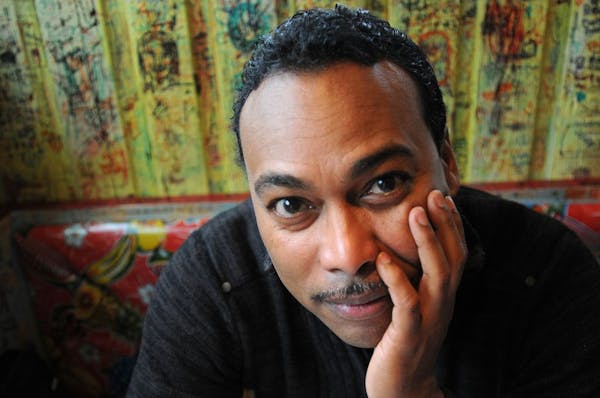Poet Langston Hughes sits in his robe at a small desk. Surrounding him are books, a nearly finished bottle of liquor and discarded drafts. He taps out a line on a manual typewriter, which we see projected on a screen, then examines it. He balls up the paper and tosses it onto a pile on the floor.
In the scene, set in 1953, the poet is working on one of his distinctive distillations in rhyme and rhythm. This piece is more meaningful than others, though, because the poet feels impelled to justify his work and capture his mood about what's happening in his life. The next day, this artist who lives in Harlem in a world of metaphors and images must go to Washington to explain his political writings to a gray-suited panel of literal-minded U.S. Senators.
The Hughes in Carlyle Brown's new play, "Are You Now or Have You Ever Been," is different from the historic figure we know. In his readings, which are available on recordings, Hughes did not enliven his own poems much. But onstage, actor Gavin Lawrence -- under the steady, steely direction of Noel Raymond and the hot lights of Michael Wangen, dressed by Clare Brauch and performing in a two-sphere set designed by Joseph Stanley -- gives us a man of magnetism who also is in shock.
His eyes, by turns wide-eyed with fear and twinkling with warmth, reveal his conflicting emotions. Hughes knows that by testifying in front of Sen. Joseph McCarthy's anti-communist witch-hunting panel, his life is about to change forever. He appeals directly to his readers (the audience at the Guthrie Theater, where the play premiered Saturday) not to abandon him. He wants us to remember him for his poetry, not whatever insinuations of un-Americanism may come out of Congress.
Playwright Brown, who also plays Hughes' lawyer at the hearing, infuses this one-act with Hughes' poetry. In fact, Lawrence often makes the poems sing, delivering them with such force and power that audiences interrupt the action with applause.
Its intellectual heft is part of what's so compelling about "Are You Now." This is a play about the power of ideas and also the difficulty of pinning down the imagination. At one point, Hughes tells his interrogators that visiting a Baptist church does not make one a Baptist.
His Senate hearing pushes Hughes' anxieties to the surface, and he becomes a literary critic who takes on Ralph Ellison, Richard Wright and James Baldwin (Lawrence's Baldwin rubber-faced imitation is a highlight of his engrossing performance).
The panel of Hughes' interrogators -- Sen. Joseph McCarthy is played by Peter Rachleff, Sen. Dirksen by Steve Hendrickson, Roy Cohn by John Middleton and David Schine by Matt Rein -- is a footnote in this piece. They come off not just as misguided fools, but as fools with absolute certainty about their views and the rightness of their exercise of power. The play is set in a 1953 that does not feel that far away.
In heated western Minn. GOP congressional primary, outsiders challenging incumbent

Minnesota Sports Hall of Fame: A class-by-class list of all members

This retired journalist changed professional wrestling from Mankato

